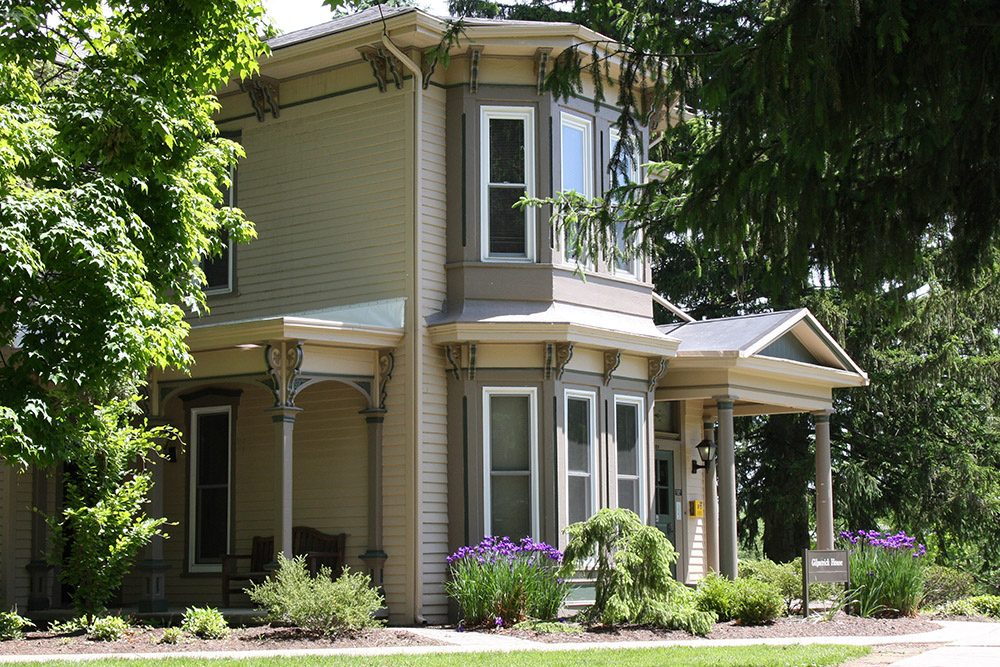Fulbright awards, summer research on African immigration to Spain, and a student-led course on tattooing around the world all stem from the same place on campus: the Lisska Center for Scholarly Engagement at Gilpatrick House. Margot Singer, associate professor of English and director of the Lisska Center, discusses the ways in which the Lisska Center is building upon Denison’s culture of mentorship and intellectual engagement.
Singer: The Lisska Center is a single point of contact for advising, programming, and funding in relation to intellectual life on campus.
We’re sponsoring an expanded array of intellectual enrichment programming, we continue to grow and support Denison's Summer Scholars Program, and we're always here to help students and faculty apply for prestigious fellowships.
What are some examples of the Center’s activities?
Singer: Our main focus in the Lisska Center is on mentorship. We're here to help motivated students identify and apply for funding for a wide range of exciting summer, semester, and postgraduate opportunities. In that effort, we're working closely with other campus offices, including Off-Campus Study and the Knowlton Center for Career Exploration.
We help students think about their interests and skills, explore options, and articulate the value of their liberal arts education. One of the things we spend a lot of time doing is working closely with individual students to help them craft strong application essays.
We have a lot going on each semester, including a program called Monday Musings, where we invite faculty members to give informal talks in the Gilpatrick House lounge on scholarly interests, research, or creative work. It's a chance for students to learn more about the range of faculty involvements, ask questions, and experience what scholarly work can look and sound like. Adam Davis, a professor in the history department, hosted a great one last year where he played a Bach cello suite and talked about its significance.
A few times during the semester, we have a lunchtime Chowder Hour program with food and conversation on particular topics – a recent lunch was held in the Denison Museum where guest artist Emory Douglas talked about his work on display in the gallery. Another opportunity gives students a chance to propose, present, and teach minicourses on topics not covered in the regular course catalog – it's called the Experimental College, an idea we resurrected from the 1970s. Last year, Sophia Higginbottam '17 taught a really popular course called “Tattooing Around the World.”
In addition to our offerings for interested students, faculty are also encouraged to come to the Lisska Center for support in gaining outside scholarships and funding for their work and teaching. They're welcome to attend the range of programs I've mentioned, and there's also a program called Research Tables, in which faculty members get funding to explore multidisciplinary topics, such as “Ethics in Cyberspace.”
There are also funding opportunities to support individually designed projects. Students interested in applying for a Summer Scholar award can come to us to find that support.
Another good example of funding is the Davis Projects for Peace, which is a nationally competitive fellowship of $10,000 grants for summer projects that promote world peace in a broad way. Every year that we’ve been part of it, we’ve had at least one winner. This past year, Mrinalini Mitra ’21, then a first-year student from India, won for her project—purchasing inexpensive solar-powered devices for Indian villages that have no electricity.
What kinds of students are making use of the Center?
Singer: There are opportunities for all kinds of students. Even Fulbright awards, which are very prestigious and competitive, do not have a GPA requirement to apply. Fulbrights are just one of the possible directions to pursue, but I mention them because Denison has an unusually good record of winning them, more than 48 have been accepted by our students since 1992. The Chronicle of Higher Education again named Denison a “Top Fulbright Producing Institution” in 2017.
The vast majority of the students we work with are simply ambitious and motivated. We hope all students will come to the Lisska Center and meet with us to explore the opportunities that are out there.
